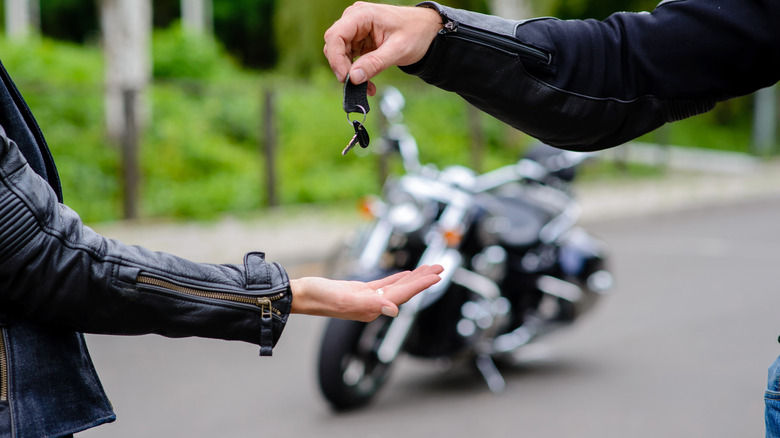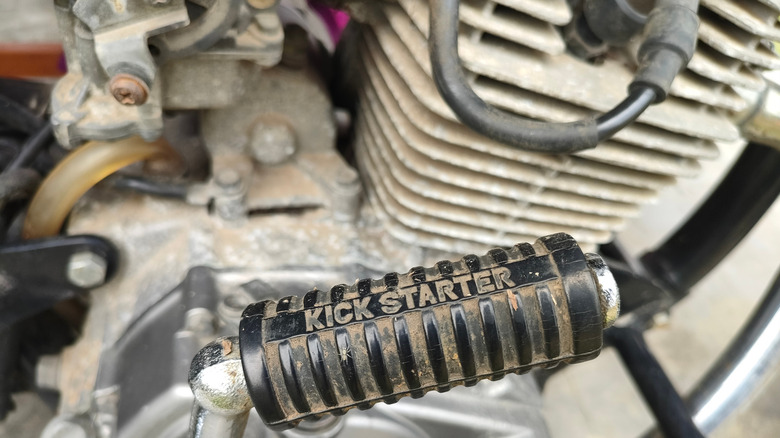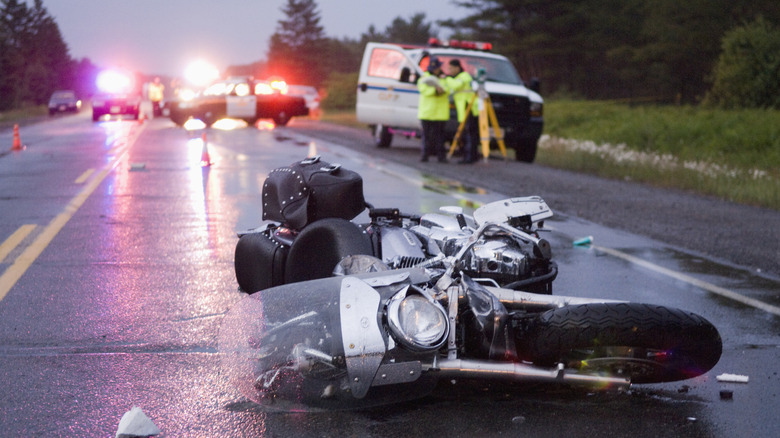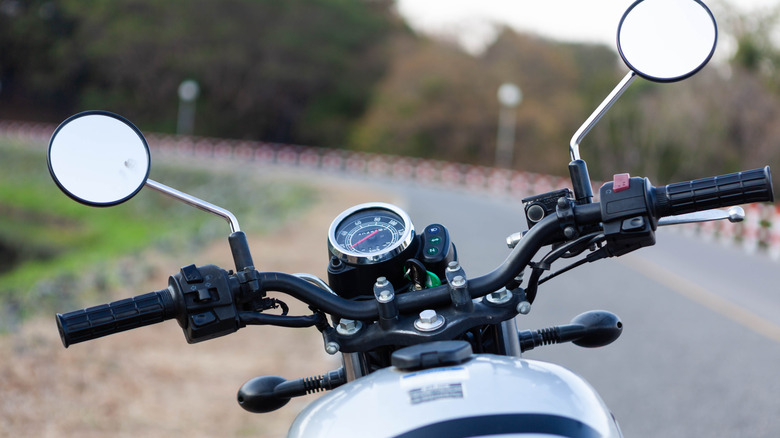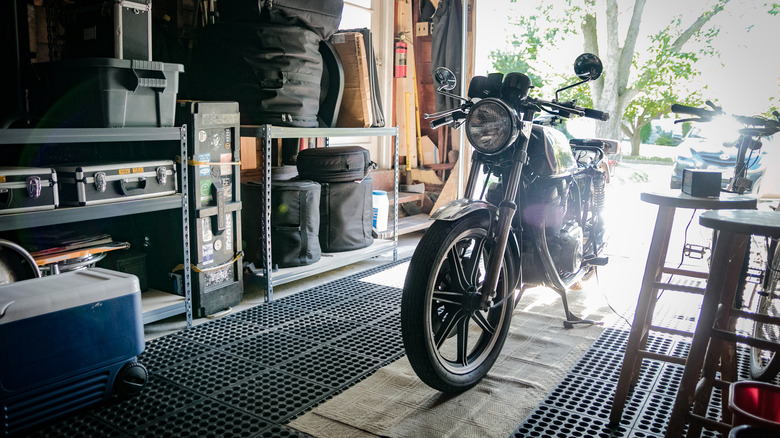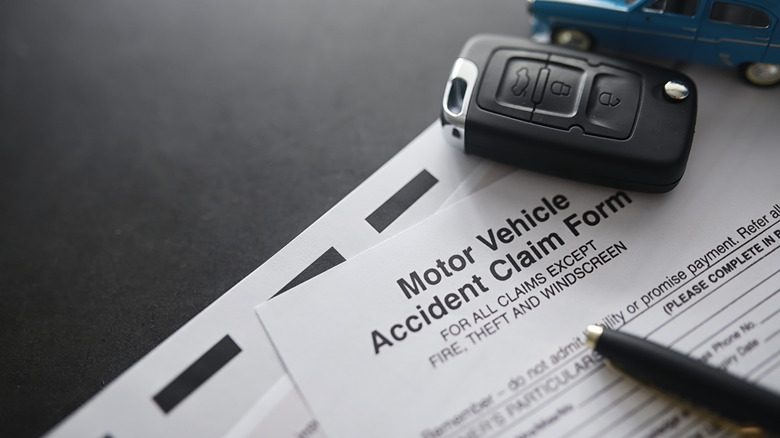5 Questions To Ask When Buying A Used Motorcycle From A Private Seller
It's always exciting to find a quality deal on a used motorcycle from a private seller, whether you've been browsing listings online or just happen to stumble upon one for sale on the side of the road. As with any vehicle, a brand-new motorcycle can be expensive. If you can find one that suits your particular riding style and seems to be in good condition for a reasonable price, then the advantages can seem rather obvious.
However, buying anything used from an individual seller, and especially something as big as a motorcycle, comes with a massive asterisk. It's not quite like buying used through a dealership, where there are more regulations to keep things fair and legal. If money is going to change hands exclusively between you and this other individual, then it's on you to do all the research and info-gathering that would normally be handled for you by a dealership. If you don't do your due diligence in this process, you might end up with a lemon of a bike — one that looks good enough for an online photo and literally nothing else.
How long have you had this bike?
First and foremost, you should ask the seller how long they've been in possession of the motorcycle. Age is one of the major defining factors for just about any kind of used product, and motorcycles are no exception. After all, even if the seller has done their best to keep the bike in tip-top shape over the years, the mere fact that it's got some mileage under its belt can imply various things about its overall condition. This, in turn, could affect the bike's value.
Say, for example, the seller has owned the bike for around 20 years. In that time, how often has the bike been ridden? If it's been ridden around every single day for two decades, it's definitely going to have some wear and tear, more than enough to wear out some of the internals to the end of their lifespans. Even if any worn-out parts were replaced with brand-new ones, that's still something you need to know about. Alternatively, has the seller not ridden the bike much at all in that time frame? In that case, that would imply the bike has been sitting in a garage that whole time. If it's only been revved up once in a blue moon, there might be some corrosion sitting out of sight.
Has the bike been in any crashes or accidents?
Another vital info point for a used motorcycle is whether it's been damaged in any way, shape, or form. Any kind of accident, from the smallest ding to an absolute mess of a crash, needs to be known to you. If the bike has been damaged at all, that implies it's either had some restoration work done or the damage is either cosmetic or out of sight.
Either way, if you buy a bike that's been damaged, the responsibility for handling the effects of that damage will fall to you. To clarify, if the seller is upfront about any damage, scuffs, or remnants of aggressive riding, and the price of the bike reflects that, that's not an automatic dealbreaker. Sometimes it's fun to buy a dinged-up bike if you're into restoration work. If, however, the seller is being cagey about the bike's overall history and condition, that's a big red flag. It implies that, rather than a beloved vehicle, it's a piece of junk they're trying to flip for a quick buck at your expense.
Is there anything unusual about this bike?
Let's assume the bike doesn't have any obvious problems that you can discern from a glance, either from a picture or in-person. That doesn't automatically mean that it's in mint condition. You should ask the seller if the bike has any particular quirks or idiosyncrasies that you may experience while riding or owning it. Even if a used vehicle looks perfect, it can be quite annoying to find out that the turn signals get stuck or the shifter needs some extra force to move.
Anyone who has owned a vehicle for a sufficiently long amount of time should be able and, ideally, willing to tell you about any weird quirks that it exhibits. Some quirks aren't a dealbreaker, as they may seem minor in your eyes, or you're willing to take the effort to fix it yourself. If you hear anything that makes the motorcycle sound like it would be a hassle or, more importantly, dangerous to ride, though, that's an instant rejection. You could say a quirk or two are a given when buying a used motorcycle — that may be, but it's still going to be your butt in that seat. If it's not something you'd be comfortable riding in, it's definitely not something you should pay money for.
Can I check the bike out cold?
It's one thing to see a used motorcycle stationary, but it's another thing entirely to see it in motion. Actually operating the bike can reveal a lot of things about its health and quality. If you're going to check the bike out in person, you should ask if you can do so while the engine is cold. If the engine is cold, that means you'll need to start it up first to check it, as opposed to the seller just rolling it into the driveway. If they're hiding the start-up from you, it might mean there's a problem with starting the bike.
If at all possible, you should request the chance to take the bike for a test drive, from start-up all the way to parking after a ride. There's no better way to get a feel for a ride than riding it yourself. Some sellers may be reluctant to offer a test drive before money changes hands, which is understandable. In this case, you should instead ask them to drive it in front of you and perform some simple maneuvers. Even if you're not the one in the seat, you can still watch them with a critical eye to see if any unrevealed aspect of the bike is giving them trouble.
Can I see the bike's paperwork?
So the motorcycle seems fine, and if there are any quirks, they're not enough to deter you. If all the obvious physical checks have passed cleanly, then that means it's time for the boring part: the paperwork. It doesn't matter how good the motorcycle seems to be, the proper paperwork is an absolute necessity to seal the deal. No papers, no cash.
First and foremost, the seller must have the motorcycle's title on hand and available for your inspection. Anyone can put a motorcycle up for sale on the side of the road, but if they can't prove they actually own the bike in question, there's a possibility that it's been stolen. The last thing you want is to end up with a hot bike dumped in your lap. Check out the title, and take particular note of the listed VIN. Make sure the VIN on the title matches the one printed on the motorcycle, and that the owner's name on the title is the same person you're buying from. Besides the title, you should also request to see any maintenance records. Even if the bike looks pristine, you have a right to know how much professional work has been performed on it.
